uNder: Best New Artists (October, 2022)
featuring Khanyisa, Baaba J & 4IAM
featuring Khanyisa, Baaba J & 4IAM
Here is a fact: the talent pool is deep and far-reaching. That’s exactly what uNder seeks to spotlight. Whether with artists on the African continent or with artists in the diaspora who bear African roots, there is always talent waiting to be discovered. These artists, at varying degrees of development, continue to put out music, hoping to carve a home for themselves in the hearts of music lovers globally. In today’s Internet-powered world, artists have found accessible ways to make headway and find listenership.
In this month’s edition of the uNder column, The NATIVE’s editorial staff move from Abuja-based rapper OdumoduBlvck brand of Okporoko music to Ghana’s Baaba J’s smooth-flowing lyrics about her daily life and South Africa’s Khanyisa’s Amapiano-powered singing and more.
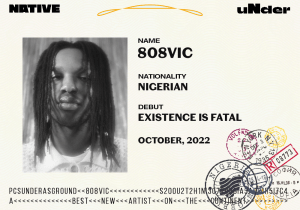
808Vic considers himself a bedroom musician who makes bedroom pop, a DIY music movement categorised by minimalistic, lo-fi instrumentals that features elements from multiple genres such as R&B and Hip-Hop. He began his career in 2016 as a producer after moving to London, adding his unique touch to songs of renowned artists such as Aaliyah, Chance the Rapper, Drake, and Post Malone, which he uploaded on SoundCloud. In 2018, he began adding his beats the following year, he released two EPs ‘Floppy Files’ and ‘Wav’s for the Summer.’ Those projects contained tales of his teenage years, from seeking love to making friends.
Born Victory Obot, 808Vic’s works have earned him placements on Spotify and BBC1Xtra. Last year, his EP ‘lived to love’ marked a change in his sonic direction; compared to the lo-fi nature of his previous outputs, the project sounded polished and expansive. Over a heady Pop bounce, he rid himself of the blame of a failed relationship on the title track. “Made my way/Saved my soul/Can’t be slain/After pain I still remain/Lived to love another day,” he sang. On “21,” off the same project, his clear-eyed introspection exemplified his maturity as a person and artist.
Last month, he released the two-song EP ‘Vic’s Odyssey.’ With an album in the works, 808Vic is making remarkable strides in his career; his journey embodies passion and consistency, two qualities that have followed him since his days as a teenager. For 808Vic, music means everything to him. “Like even if I don’t blow, I’ll still breathe music,” he says. “It’s helped bring me out of tough times, provide clarity and inspire me. I really feel privileged to be able to make it because there’s few feelings like the rush you get finally getting that melody right or stumbling into a new chord progression, or going to a live show and losing your voice singing along, I could go on.”
Uzoma Iherijika
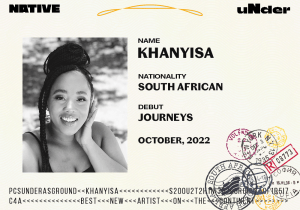
While many may know Khanyisa for her stellar performance on Vilosoul-produced track “Zula Zula (Hub Way)” featuring Amapiano stars, Focalistic and Acutedose, others recognise her from TikTok. Khanyisa Patricia Jaceni is a South African social media personality from Mpumalanga (Embalenhle) and very well known for the versatility of content she creates on the app. Her popular catch phrase, “Bottom Line” and her overall comedic presence on the app, scored the artist Social Media Influencer of the Year for the 1st annual edition of Basadi In Music Awards in Johannesburg. A couple of viral videos, Khanyisa began her music career in the early parts of 2021 with the release of her debut EP, ‘Journeys’ in 2021. However, she didn’t gain popularity for her music until she featured on an electrifying Amapiano “Ungangi Bambi” by one half of JazziDisciples, Mr JazziQ.
Since then, Khanyisa’s witty and related online persona coupled with her strong sense of ethnic identity which translates in her tracks, has helped her connect with audiences in South Africa and beyond. With the release of “Bheka Mina Ngedwa” supported by Marcus MC, Lady Du and Tsiki XII, Khaniyisa’s success rose to new heights, stamping her as a force to be reckoned with in Amapiano. In her short time in the scene, she has released three EP’s and a slew of singles, drawing the attention of major Amapiano heavyweight, Kabza De Small. Her recently released EP, ‘Halfway’, features 6 tracks laced with heart-thumping beats sure to deliver a sublime experience for its listeners. From mid-tempo intoxicating tracks like “iNkukhu” featuring Da Muziqal Chef with high quality production from Kabza De Small to “Ndikwethembile” and “Xoki” which features the artist’s ethereal vocals across low cadence percussion beats.
Through the 40 minutes duration of ‘Halfway’ and her other features and singles, Khanyisa’s star is only shining brighter. With each release, she takes listeners along on a journey as she explores Amapiano and a plethora of sounds emanating from that side. A promising act, every Khanyisa track is sure to transcend language barriers as she expresses a variety of emotions through her vast vocal range.
Nwanneamaka Igwe
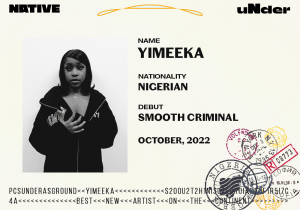
R&B sounds emanating from these parts seem to have a rising star on their hands with the release of Yimeeka’s debut EP ‘Alter Ego.’ Her personality, leaning more towards the introverted side made the days leading up to the release nerve wracking for a number of reasons including the sheer rawness of the project from the production and performance perspective. A skill she picked up during the COVID-19 lockdown, Yimeeka began trying her hand at production with the assistance of a friend of hers, Pheelz. Still sketchy on her production skills, Yimeeka held off on sharing her work. However with a couple of lessons and encouragement, Yimeeka became ready.
We get a whiff of her mellifluous vocals and dazzling penmanship from her Pheelz-assisted debut single “Smooth Criminal.” Still reeling from his chart topping hits like “Finesse” featuring BNXN and “Electricity” with Davido, Pheelz couldn’t be a more perfect choice for Yimeeka. His masterful songwriting and Yimeeka’s vulnerable rendition are a match made in heaven. On working with Pheelz, Yimeeka shares “I made the song with my guy so it felt natural. It was the song that took the shortest to make so that speaks to how seamless the creative process was.”
Shortly after the release of “Smooth Criminal”, Yimeeka rolls out with ‘Alter Ego.’ “I want to send my message out as loud as possible”, Yimeeka shares with the NATIVE. The 7-track project combines Yimeeka’s raw, honest storytelling with authentic production. From the spoken word “Interlude” where she asks questions regarding love and the meaning of life to “Memories” which conveys the all too familiar emotion of missing an ex-lover, Yimeeka’s message on ‘Alter Ego’ is sure to cut across and leave an imprint on her audience. Ultimately, she communicates the need for patience and taking risks to sharing, “I would like them (listeners) to know that they should never be scared to do things. It’s fine to start small and grow from the mistakes.”
Nwanneamaka
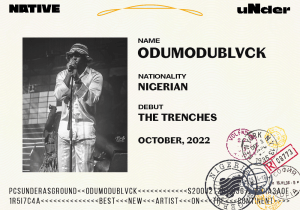
Born and raised in Lagos, Odumodublvck moved to Abuja when he was seven years old. He has mainly resided in the capital city ever since, operating as an enigmatic presence in its buzzing rap scene. Possessing the gruffest vocals you’ve ever heard, Odumodublvck has coloured Drill and Afropop beats with his infectious candour since releasing his first single in 2017. Over-the-top metaphors reminiscent of early Eminem are matched with cultural references from deep inside rural Nigeria, establishing the name of Odomodublvck as one of Nigeria’s most exciting rappers.
Odumodu has acquired the reputation of a young OG within music circles. He’s heavily collaborative, joining other exciting talents from ABJ to construct its lore in Nigerian rap discussions. ‘The Trenches’ and ‘Time And Chance’ released respectively in 2018 and 2021, along with several collaborative projects in-between, demonstrates the evolution of Odumodu from a verbose MC into a more poignant music-maker. His latest single “Dog Eat Dog” resides on those softer plains, carried by Odomodu’s sombre vocals which subvert the capitalist-evoking title to deliver an impressionable love record. “Say my future bright but they gossip that,” he sings assuredly, progressing from the more haughty ways of his earlier days.
These days, Odumodu has been seen with a lot of heavyweights in the music industry. From Nigerian rap legends giving him his flowers to Skepta sharing his music, the world seems to be ready for his generational talent. A new single with the newly minted NATIVE Records and Def Jam is also on the way, and for a man who believes strongly in Jesus, it does feel like prophecy. Big Gun—as he calls himself—is shooting for the top, and who’s going to stop this uNder star? No one.
Emmanuel Esomnofu
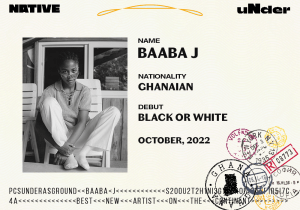
Limitless artistry sounds the alarm for Baaba J’s entry into the Afropop scene. The Ghanaian musician bleeds her soul into every song she creates, maintaining a heartfelt core even when flitting across the possibilities of genres from neo-soul to Ga-inflected folk, Reggae and other broader forms within Western Pop.
Two years ago, Baaba J began making in-roads into the deeply creative art scenes which resided just outside the mainstream. Her debut “Black or White” is poignantly reminiscent of the civil rights agitations which happened worldwide that year. The artist’s wisdom is revealed early on, as she sings over swinging, melancholic guitars, “Lately I’ve been seeing people dying on the streets, cops be killing/ Social media sign petitions, nothing changes for us.” It would later feature in her debut project, ‘Lumumba St.’ which introduced her scintillating range to the notice of listeners within Ghana and beyond.
On five records, Baaba explored emotions which ranged from poetic affirmations of one’s love (“Intro”) to possessive admiration (“Forever”) and diaristic storytelling captured over sun-soaked basslines and flutes (“Play Along”). The project closer “Tomboy” sees Baaba claim the titled tag that’s often meant to be derogatory, shedding layers of her quirky nature. “I’m aware I pull both sexes well that ain’t really on me,” she sings over Trap production, quite reminiscent of Ayra Starr’s “Bridgerton.” This year, Baaba J has released “Outside,” a song that continues her unique blend of groove and melancholy, singing, “Don’t know why I’m outside…don’t know why I try,” putting words on an emotion many young people feel but cannot possibly express without crashing into the wall of memories.
Emmanuel
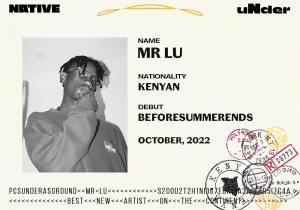
For Kenya’s Mr LU*, improving his skills as an artist is a great source of pride and it’s a unique combination of skill, attitude and impeccable work ethic that has enabled him to build a repertoire of genre-defying music. “My music is experimental,” Mr LU* shares with the NATIVE. “I don’t want to fit in a box.” Over the years, the singer and producer has created an impressive catalogue of alternative records, each furthering his global ambitions and woven through poignant and relatable tales for young adults.
Starting out his early career days under the moniker Slinky, he found his feet in music production which he has studied earnestly since 2015. A true student of the game, Mr LU* found his feet in the scene during the haydays of Soundcloud, which he used as a direct-to-listener medium to push out his music to his growing audience. It was not until 2018 that MR LU* decided to release his debut EP ‘BeforeSummerEnds.’ The instrumental EP catapulted him to new heights with his futuristic, ubiquitous production that set him apart from his peers. From the lo-fi basslines in “SummerFling” which takes listeners through a short fling during the summer to the relatable vulnerability on “NewTing”, Mr LU* is always shifting the needle on his creative output.
While he now has a steady string of singles and 3 albums to his name, Mr LU*’s breakout didn’t come until the release of “Tropkos Riddim” in 2018. On the track, Mr LU* showed his penchant for genre-mashing as he delved into the much-loved Gengeton with ease. His raw voice compliments his production techniques in his latest project ‘Kazi Kwa Vijana’ which was released earlier this year. With songs such as “Nakujali” featuring King Kerby and Mars Maasai, Mr LU* shows his growth over the years as he offers a deeper emotional palette on his newer releases. 2022 has been a busy year for Mr LU* and already, he’s co-produced Maya Amolo’s “Can’t Get Enough” and “Foundry” featuring Lanzi, while also releasing his solo material. Whether you’re a fan of Chevy Kev or Mars Maasai, it’s worth diving into Mr LU*’s expansive catalogue which proves why he deserves to be featured on our uNder list this month.
Tela Wangeci
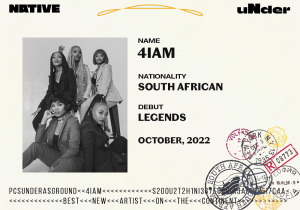
These days, music groups are far and few between. However, this does little to dishearten South African girl group, 41AM, which is pronounced as For I Am. Formed in 2021, the group was created by HitChat Entertainment in a bid to allow talented but disadvantaged South African talents to flourish. The musical girl gang is composed of 5 formidable singers and songwriters including Doli, PHX, Annie, Grace and Giselle who have one clear message: “seek to achieve your dreams, no matter where you come from.”
With a shared love for K-pop (Korean Pop), 4IAM decided to take an unconventional approach to their music and fashioned their own unique sound, T-pop which is popularly known as township pop. The effortlessly talented group draws on pop culture, dance and international pop productions to create a completely unique listening experience. The group made their debut in 2021 with “Legends,” offering the perfect mix of South African-helmed sounds, Amapiano, Pop, Kwaito, House and Hip-Hop. The track’s catchy production provided the perfect backdrop for the girls to share their message of hope, reminding everyone they are a hero in their own story.
Two years later, 4IAM released the standout number “Think About You” which instantaneously drew listeners in with its catchy sing-along chorus. Elsewhere in their short but sweet catalogue, 4IAM shared the airy single, “On Top,” which sounds like a late night conversation with your girl squad. Utilising lush airy soundscapes, percussive bass drums and crescending trumpets, which herald back to the halcyon days of ‘90s R&B, the group provides the perfect blend of undulating vocals. Another strong single in their repertoire is 2022’s “Level Up” where the quintet pull together kiss-offs and spilled tea about their haters and exes with smooth precision. There’s also a clear elevation in 4IAM’s output as gleaned from their most recent release, “Mthebelele,” and the lead single off their forthcoming album. Over syrupy synth production, the girls sing about staying humble and acknowledging your own self-worth and power. What’s coming next for the uNder stars? “We want people to understand our relationship of 4IAM as a group and individually. We also want people to understand they are unique in their own way. Just be you and people will like you for who you are.”
Tela
Featured image credits/

